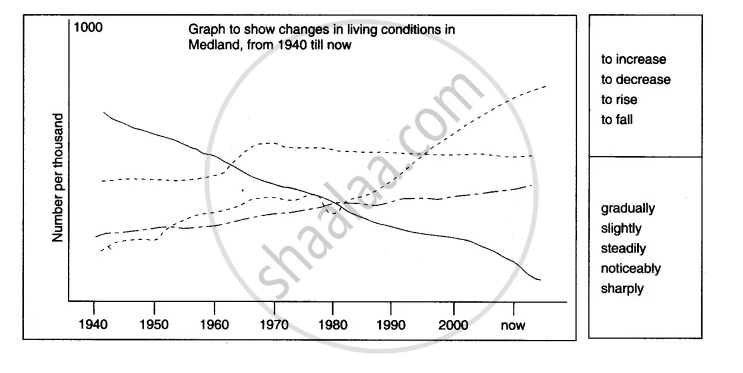Advertisements
Advertisements
प्रश्न
Look at sentences in Column A. Match them with the appropriate explanation in Column B.
| A | B |
| 1. Next Friday is the 29th of May. |
a. emphasizing that something will happen very soon |
| 2. I’ll have left by the time you get here. |
b. making a promise |
| 3. I’m visiting my uncle on Sunday. |
c. predicting that something will be true at a given time in the future |
| 4. I’ll send the photographs as soon as I can. |
d. stating something which is a certainty |
| 5. The lesson is about to start… hurry! |
e. reporting a decision made earlier |
| 6. The population of our country will increase in the next ten years. |
f. making a prediction about future events |
उत्तर
| A | B |
| 1. Next Friday is the 29th of May. |
stating something which is a certainty |
| 2. I’ll have left by the time you get here. |
predicting that something will be true at a given time in the future |
| 3. I’m visiting my uncle on Sunday. |
reporting a decision made earlier |
| 4. I’ll send the photographs as soon as I can. |
making a promise |
| 5. The lesson is about to start… hurry! |
emphasizing that something will happen very soon |
| 6. The population of our country will increase in the next ten years. |
making a prediction about future events |
APPEARS IN
संबंधित प्रश्न
Identify the rhyme scheme of the poem.
What according to you are the stages of a person's life? What characteristics
would you associate with each stage? (e.g., childhood: innocence, joy
Read the following extract and answer the questions that follow by choosing the
correct options.
Monseigneur, the Bishop is a ... a-hem!
(a) Why does Persome not complete the sentence?
(i) she used to stammer while speaking.
(ii) she was about to praise the Bishop.
(iii) she did not wish to criticise the Bishop in front of Marie.
(iv) she had a habit of passing such remarks.
(b) Why is she angry with the Bishop?
(i) the Bishop has sold the salt-cellars.
(ii) the Bishop has gone to visit Mere Gringoire.
(iii) he showed extra concern for Marie.
(iv) she disliked the Bishop.
The convict is the product of the society he had lived in, both, in terms of the
suffering that led him to steal a loaf of bread, as well as the painful sentence he
received as a punishment for his "crime". He was imprisoned for stealing money
to buy food for his sick wife. This filled him with despair, hopelessness,
bitterness and anger at the injustice of it all.
Conduct a debate in the class (in groups) on the following topic. Instructions for
conducting a debate and use of appropriate language are given in the unit “Children” of
the Main Course Book.
'Criminals are wicked and deserve punishment'
Imagine that you have just returned from Topo Island. The Editor of a local newspaper has asked you to write about your adventure. Write the article.
Some hints :
1) Very briefly, describe how you landed on the island, and the main features of the island.
2) Write about where you set up camp, describe one main adventure, and how you were eventually rescued.
3) Make the adventure part of your story exciting, with lots of action.
4) Include dialogue in the adventure part.
5) Try to create mystery and suspense, as in B.3.
6) Finally, give your adventure story a suitable heading.
7) Your story must be written in paragraphs and should carry your By line.
Now write three situations similar to (a) in the box. Exchange the information with your partner and guess the answer to each other's situations as in (b).
Question 1.
My dog is barking angrily and is trying to get loose.
Question 2.
The car is making a curious noise.
Question 3.
Satish enters breathing heavily.
Satish enters breathing heavily.
(4)

The table below provides you with a list of modals that are used to express necessity and permission.
| Necessity I obligation | Permission |
|
Positive must obeying have to authority need to ought to right thing should to do |
Positive can (less formal) may (more formal)
|
|
Negative must not cannot ought not to |
Negative need not do not have to
|
Answer the following question by ticking the correct option.
Cecil Barker's first reaction at the sight of the dead Douglas was to _____
Rearrange the jumbled words to form meaningful sentences.
(a) at developing / there have been / a modern / many attempts / snowboard
(a) ______________________________________
(b) ______________________________________
(c) and a rope / at the / two skiis / were bound / was placed / front end / together
(c) ______________________________________
(d) declared / snowboarding / in 1994 / was / event / an Olympic
(d) ______________________________________
(e) across the globe / is a / this recognition / huge victory / snowboarders / to the
(e) ______________________________________
Identify the functions of the prepositions in each of these sentences.
1. George Washington served as the Commander-in-Chief during the
American Revolutionary War.
2. The assassin shot the leader with a gun.
3. Pratap bequeathed his property to charity.
4. Manoj was awarded a certificate for his good conduct.
5. The roof is covered with fire-proof sheets.
